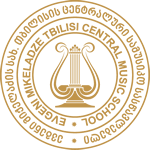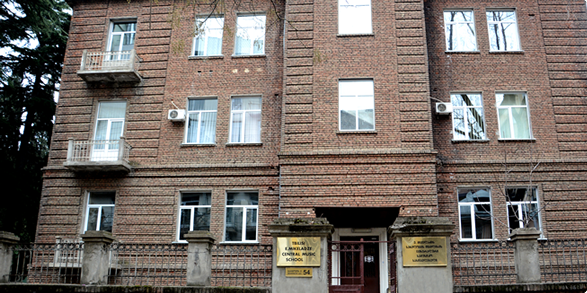Tbilisi School #9
∞
Evgeni Mikeladze Central Music School was established in 1922 as a music studio, which afterwards was transformed into E. Mikeladze Tbilisi Music Shool #9.
In 1951, director of the school became Ilia Kharabadze (1914-19178), young, active musician, violinist and afterwards honored teacher of Georgia. His distinguished talent transformed the school into one of the leading laboratories of young musicians.
Through his immense efforts, the school obtained separate building at #54 Barnov street, Tbilisi The school has the same address since 1971 (before that it was based under #183 and since 1961 under #53 secondary schools’ buildings). Since 1973 the school bears Evngerni Mikeladze name which was also merit of Ilia Khrabadze who coincided this event with 50- year anniversary of the school and the 70th birthday of famous Georgian Conductor Evgeni Mikeladze. This event was celebrated in the recital hall of the Tbilisi Conservatoire. (See the gallery).
New building and school expansion brought fresh air for the school and created broader possibilities for students’ music education. The school obtained new instruments, new pianos in the schoolrooms. At that time, one of the modern music audio- cabinet was established which was equipped with rich selection of gramophone records and tape- recorders. Such cabinet provided opportunities for teachers to conduct classes using all the necessary illustrative and audio music materials.
The school founded children trio and quartet ensembles, choir, children chamber string, wind orchestras where teacher also were performing jointly with their students. It should be noted that male students from piano department, studding wind instruments as secondary specialties, also performed in the wind orchestra.
Such educational reforms transformed E. Mikeladze Tbilisi Music Shool #9 into one of the leading centers of children music education. It was always among leaders during Tbilisi Schools Inspections. Number of schoolchildren was awarded by the prizes, diplomas and teachers with state prizes from the Ministry of Culture of Georgia.
Number of highly qualified and famous teachers worked in the school. The head of the piano department was Nino Pharkosadze. Such famous teachers led piano classes as Margarita and Larisa Bakhtadze’s, Guliko Gabashvili, Lili Gabunia, Diana Khirseli.
Head of the Orchestra Department was Henrix Shaverdian, tutor of many famous violinists of Georgia. Such well-known teachers were leading violin classes as Shota Shanidze and Irakli Beridze, later professor of the Tbilisi State Conservatoire, Nukri Davitashvili, (chello), Edisher Datebashvili (contrabass), Otar Ramishvili (guitar), David Erikashvili (flute), Guram Chinchaladze and Boris Lazarev (clarinet).
Theory classes were provided by Natela Chikhladze, Medea Khebakhiani while composition was taught by Meri Davitashvili, famous Georgian composer and Misha Shugliashvili, well-known theorist and composer. Most of their students follow music carrier and they work successfully as of today as in this school so in Tbilisi conservatoire, orchestras and other music institutions. Some of them went further in the music carrier and established strong names in the international arena.
In 1978, Ilia Kharabadze passed away and the school director became George Korkadze, young, energetic musician and violinist, which leads the school up to present. During his period, the school broadened its success. The school students had been constantly participating at the young musicians’ festivals locally and in other republics of Soviet Union obtaining leading prizes. (See our laureates).
G. Korkadze continued and expanded Ilia Khrabadze efforts to establish, built and strengthen contacts and friendship relations with other music schools of the region and other republics. Number of exchange concerts in Tbilisi as well as in Moscow Leningrad, Kiev, Odessa, Riga, Yerevan, Baku and Kirovabad took place. Moreover, the students of the school were invited at the scientific conference in town Lodze, Poland, were issues such as music education in the music schools were discussed.

